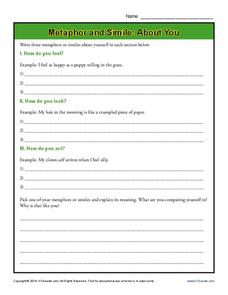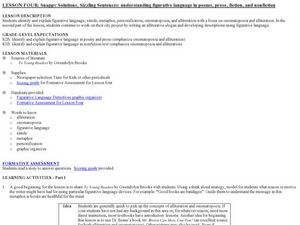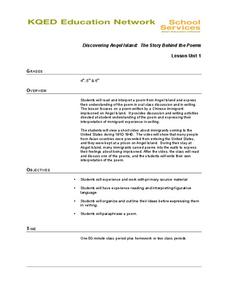Poetry4kids
Personification Poetry Lesson Plan
Scholars take part in two exercises to boost their knowledge of personification. After reading a detailed description and excerpts from famous poems, writers list action verbs and objects then combine words to create a humorous...
Curated OER
Use of Personification and Imagery in Poetry
A reading of Theodore Roethke’s dark "Root Cellar" and Sylvia Plath’s more abstract "Mirror" launches a discussion of imagery and personification in poetry. After finding examples of personification in the poems, class members craft...
K12 Reader
Metaphor and Simile: About You
Class members will be as confident as prize-winning thoroughbreds after completing a worksheet on figurative language. Young writers jot down metaphors and similes for three categories: they way they look, they way they feel, and the way...
Curated OER
Focus On Figurative Language in Prose
Students examine the use of literary prose in the story, "Dark They Were, and Golden-Eyed." In this literary prose lesson, students investigate the use of imagery, metaphor, and simile in the story. They tell how author's purpose is...
K12 Reader
Adventures with Alliteration! - Adjectives
Have hearty humor with a handy, helpful handout! Kids work on their alliteration skills with a figurative language worksheet that focuses on alliterative adjectives and phrases. After kids add nouns to ten adjectives, they create five...
EngageNY
Poetic Tools in Narrative of the Life of Frederick Douglass
Scholars listen to a reading and answer probing questions about If We Must Die by Claude McKay. Readers annotate their personal copies of the poem as they discuss its figurative language, vocabulary, and meaning. They then transfer their...
Geography 360°
Poetry Writing
Put the tips and tricks in this guide into practice in order to encourage your pupils to blossom into poets. A wonderful reference material for teachers, this packet includes definitions of poetic terms and forms as well as step-by-step...
EngageNY
End of Unit Assessment: Writing Best First Draft of “Back Again” Poem
Team up! Scholars begin working with their research teams to review the components of an effective poem. They then move on to independent work by beginning the end-of-unit assessment. Writers complete the draft of their "Back Again"...
EngageNY
Looking Closely at Stanza 3—Identifying Rules to Live By Communicated in “If”
Just as Bud, from the novel Bud, Not Buddy by Christopher Paul Curtis, had rules to live by, so does the poem, If by Rudyard Kipling, but how do the two relate? Pupils delve deep into the poem's third stanza, participate in a grand...
Curated OER
Fall Similes
Fall is like a beautiful painting come to life—or is it more like an overflowing cornucopia? Practice writing similes with a lesson on figurative language. As learners review simile structure, they come up with their favorite similes for...
Curated OER
Short Poems Are Scary!
What do all those chairs and pencils do in the classroom once everyone leaves? Allow imaginations to run wild with frighteningly short poems!
Winterhill School
Poetry Analysis
Gain greater insight into poems using a poetry analysis worksheet. Here, scholars follow steps and answer questions to dissect any poem. Topics include the poem's meaning, theme, technique, and structure, as well as personal thoughts and...
Curated OER
Metaphor Meanings
Help your young writers decipher the literal meanings of metaphors. After reading several metaphors, learners write the real meanings that the phrases are describing. Use this resource in a figurative language lesson, or when preparing...
K12 Reader
If
Rudyard Kipling's advice to his son in the poem "If" is a resounding message that echoes through generations. After reading the famous poem, middle schoolers work on analyzing specific lines, completing activities based on unfamiliar...
Curated OER
Unknown Frost Poem Discovered
What? A long-lost poem from Robert Frost? Introduce your class to a poem recently found and published from Robert Frost's personal collection. The lesson includes background information on the author, the poem itself, and a list of...
National Park Service
The Poet's Toolbox
If you need a lesson for your poetry unit, use two poems by Henry Wadsworth Longfellow ("Rain in Summer" and "The Slave in the Dismal Swamp") and a resource on Elements of Poetry. The lesson plan guides you through activities on...
Curated OER
Digging Deep for Figurative Language (Hyperbole)
What are hyperboles? Examine the attributes of hyperboles with your high school classes. Pupils read selected poems and prose selections that feature hyperboles and discuss their functions in each work of literature. Specific poems and...
Curated OER
Simile and Metaphor- Poetry Toolbox
Illustrate the connection between using figurative language (specifically similes and metaphors) and creating poetry. First this worksheet reviews the definition for each, and then writers create the endings to two examples provided....
Curated OER
Identifying Figurative Language #1
In this identifying types of figurative language worksheet, students read sentences and phrases, determine if they are similes, metaphors, hyperboles, personifications, or a combination, identify the type/s and write an explanation of...
Curated OER
Language Play
Introduce your scholars to onomatopoeia and alliteration using a language elements worksheet. They examine six sound words and match them to four pictures. Next, learners read two examples of alliteration and write one of their own. They...
Curated OER
Snappy Solutions, Sizzling Sentences
An examination of the figurative language in Gwendolyn Brooks’ To Young Readers challenges your writers to think about the richness of language. Ask your class why Brooks says, “Good books are bandages.” This discussion of alliteration,...
Curated OER
Figurative Language in Poetry and Prose
Students examine the impact of sound devices in poetry. In this poetry instructional activity, students read the listed poems and identify uses of hyperbole, simile, metaphor, imagery, and personification. Students discuss how sound...
Curated OER
Discovering Angel Island: The Story Behind the Poems
Poems carved into the wooden walls of the Asian immigrant prisons on Angel Island provide upper elementary graders an opportunity to study not only the story behind the poems but to also focus on the figurative language employed by the...
EngageNY
Grade 9 ELA Module 2: Unit 1, Lesson 10
An engaging unit connects Edgar Allan Poe and Emily Dickinson's shared themes of madness and departure from reality. The 10th lesson in the unit explores Dickinson's figurative language and structure choices in "I Felt a Funeral, in my...

























